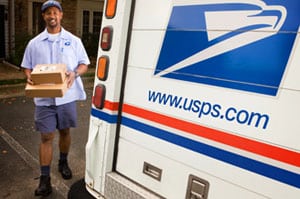 You probably wouldn’t think it strange if you saw a USPS delivery person dropping off a parcel at your front step. The same goes for a delivery person from FedEx, UPS or any other traditional shipping carrier. But how would you react if you peeped through your window and saw a person in street clothes dropping off a package at your door?
You probably wouldn’t think it strange if you saw a USPS delivery person dropping off a parcel at your front step. The same goes for a delivery person from FedEx, UPS or any other traditional shipping carrier. But how would you react if you peeped through your window and saw a person in street clothes dropping off a package at your door?
Amazon and Uber are reportedly testing crowdsourced parcel delivery services that would hire everyday citizens to transport packages. Mike Glenn, executive vice president of FedEx, recently called out a few potential roadblocks for these new programs. Since consumers think it’s important for their courier to wear a uniform and have proper identification, most people might not be comfortable with a plainclothes delivery person.
To test this theory, my company, Endicia, surveyed more than 1,000 people to find out whether consumers still care about uniforms. While plainclothes delivery is certainly making strides, the survey found 59% of consumers prefer uniformed package delivery people.
Here are four reasons why uniforms still play an important role in the delivery world:
They help establish trust and security.
When you see a doctor wearing a crisp white coat or a firefighter in a uniform, you’re more inclined to trust their authority and expertise. The same goes for a uniformed delivery person. To some, plainclothes delivery could potentially become a security issue, as 40% of those surveyed were concerned that a non-uniformed delivery person might be dangerous.
It’s also worth noting that 34% of respondents still prefer traditional carriers like the USPS, FedEx and UPS over newer delivery services due to familiarity, indicating that trust and a well-established history continue to play an important role in the delivery process.
They make it easy to identify an employee.
Uniforms allow people to distinguish who is and who isn’t an employee quickly and easily. Seventy-two percent of respondents said what they like most about carriers’ uniforms is that it’s easy to figure out what company they’re from. If someone shows up at your door without a uniform, it would be pretty tough to figure out the purpose of their visit at first glance.
They keep things professional.
An added benefit of uniforms is that they help establish a sense of orderliness and professionalism. Nobody wants to receive a package from someone who looks sloppy or unkempt. When we asked respondents what they wouldn’t tolerate from a plainclothes delivery person, 40% said dirty, ripped shirts or pants.
They reinforce your brand image.
One of the most critical benefits of a uniform is that it’s an extension of your company’s brand. There’s a reason why companies like Apple are able to convince hundreds of thousands of people to wait in lines for hours on end, just to get their hands on the newest product. It’s all about the power of the brand, and uniforms help to reinforce that image.
Keep in mind that a uniform doesn’t necessarily have to mean a full-scale head-to-toe outfit. Identifiers such as nametags, lanyards, branded t-shirts and hats work just as well. Just take a look at Lyft’s pink mustaches or the decals that Uber drivers place on their windshields. As long as people are able to recognize and identify your brand, that’s what matters.
The bottom line is that uniforms still have a place in the delivery world today. They play an important role in establishing trust, professionalism and brand recognition. However, that’s not to say that crowdsourced delivery is bound to fail. The real game-changer lies in whether these types of services are able to earn consumer trust and acceptance without relying on traditional uniforms.
Once consumers begin to view crowdsourced delivery as reliable and familiar — likely by incorporating uniform elements or other branding techniques — there’s huge potential for this kind of service to find its niche.
Amine Khechfé is general manager and cofounder of Endicia
